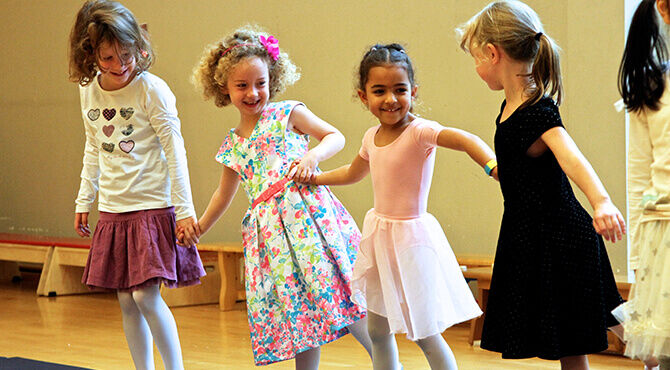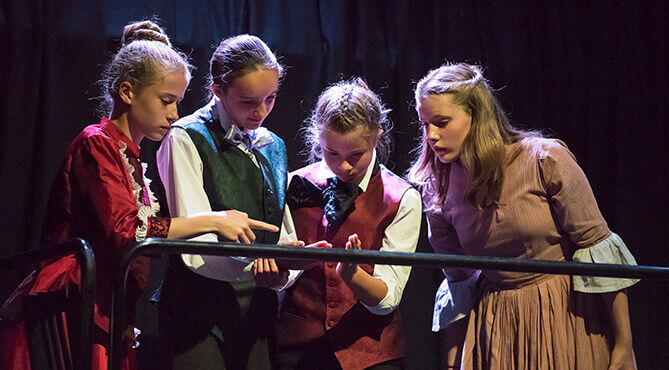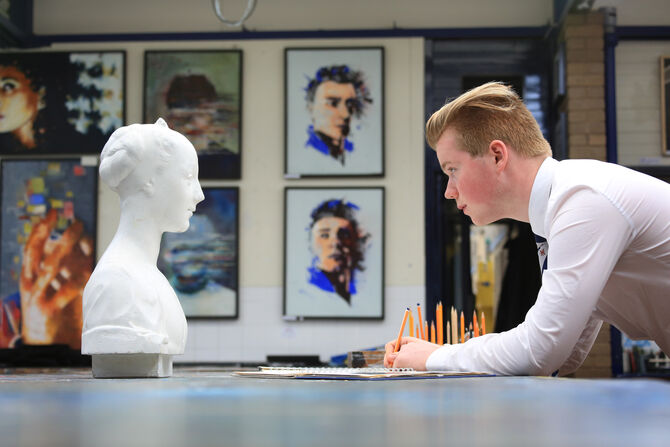The importance of creativity in the curriculum
The focus on STEM subjects over the past five years has been widely marketed as a fast track to success in technical careers where demand for global talent is outstripping supply. But is our obsession with STEM creating a creativity crisis with arts subjects being undervalued and therefore underfunded?
In a recent letter to the Guardian, a number of prominent artists, including Tracey Emin and Antony Gormley, expressed their concerns about the status of arts and creative subjects in UK secondary schools. Concerns were raised over the government’s drive for 90 per cent of GCSE pupils to choose the English Baccalaureate (Ebacc) subject combination by 2025, which does not include any arts or creative subjects.The letter said, “There is compelling evidence that the study of creative subjects is in decline in state schools and that entries to arts and creative subjects have fallen to their lowest level in a decade. Young people are being deprived of opportunities for personal development in the fields of self-expression, sociability, imagination and creativity.”The creative industries bring in £92 billion to the UK economy each year but this is often little publicised in our drive to fill job vacancies.

The global creative success of one UK state school
At the 37th COBIS annual conference held in May, Kirsty Mehta, senior assistant principal at The BRIT School in Croydon, UK – a state-funded performing arts school which boasts alumni such as Adele, Amy Winehouse and Tom Holland – explained some of the keys to its success and why she believes that arts and creative subjects should be placed at the centre of the curriculum in order to help children thrive.The BRIT School is one of just three state-funded performing arts schools in the country. Founded in 1991 by two musicians and an investment from Richard Branson, it is a state-funded school with support from the British Record Industry Trust (BRIT). The school flies the flag for both the creative and vocational curriculum – 99 per cent of its students go onto further education or employment and Ms Mehta believes strongly that the vocational subjects that students take at the school (which are part and parcel of the study programme) mean that they are work-ready and easily employable.Children can join at either 14 or 16 and – at 14 – study a core curriculum of GCSEs, which includes maths, English and science but they also have 5 hours a week dedicated to working towards BTEC qualifications in numerous performing arts subjects such as Film & Media Production, Dance, Music, Visual Arts and Design. At 16+ students can choose BTEC qualifications, A levels or a mixture of both.“Twenty per cent of our students go straight into the world of work after they leave our school because they’ve been vocationally trained,” said Ms Mehta. The hands-on experience also means that they are really able to develop their talents. Esme, a BRIT student who has recently been accepted to RADA said, “I knew I wanted to do theatre and backstage work from a young age. The BRIT school gave me the opportunities to train in what I really wanted to do.”
The school flies the flag for both the creative and vocational curriculum – 99 per cent of its students go onto further education or employment and Ms Mehta believes strongly that the vocational subjects that students take at the school (which are part and parcel of the study programme) mean that they are work-ready and easily employable.Children can join at either 14 or 16 and – at 14 – study a core curriculum of GCSEs, which includes maths, English and science but they also have 5 hours a week dedicated to working towards BTEC qualifications in numerous performing arts subjects such as Film & Media Production, Dance, Music, Visual Arts and Design. At 16+ students can choose BTEC qualifications, A levels or a mixture of both.“Twenty per cent of our students go straight into the world of work after they leave our school because they’ve been vocationally trained,” said Ms Mehta. The hands-on experience also means that they are really able to develop their talents. Esme, a BRIT student who has recently been accepted to RADA said, “I knew I wanted to do theatre and backstage work from a young age. The BRIT school gave me the opportunities to train in what I really wanted to do.”The long road to success and the importance of business partnerships
Ms Mehta says that it has taken the school 25 years of hard work to get to where it is today but it now generates global interest – Apple CEO, Tim Cook paid a recent visit to the school which resulted in a £280,000 donation of Apple products. As a state-funded school it has to rely on support like this to meet an additional £750,000 per year needed for its tech requirements.“The kind of educational provision at The BRIT School is normally something you have to pay for,” said Ms Mehta, “and I’ve often been asked how to bottle our success. The energy you feel when you walk through the door is immense and it’s difficult to provide a blueprint for that.”However, she did offer some advice to those looking to develop performing arts facilities in their schools or for families looking for a school that excels in creative subjects.The traits to look for in a school that values creativity
“Exceptional facilities and equipment are vital. We are very relaxed and free – we have no bells, no uniform, quirkiness is celebrated. Kids feel like they can be who they want to be and are accepted,” said Ms Mehta.“They also know that we trust them – we have an open door policy for all of our facilities. Students can use anything at any time, which gives them responsibility and enables them to practise. And we don’t have things stolen or ruined which is exceptional in a school with 1,300 students.”“All these children are going into the world of work and you want them to be able to be successful in whatever they do – earn a salary through creative arts or wherever their talents lie but schools are often so fixated on performance measures that creative subjects are side-lined.”
The opportunities at International Schools
International and private schools have the advantage of financial support to be able to invest in facilities but with so many competing needs, they have to value the creative curriculum if they are to invest in it.Students at Nord Anglia Schools such as The British International School of Chicago, Lincoln Park, benefit from an arts curriculum developed in collaboration with the world-renowned Juilliard School. Students participate in activities developed by Juilliard, teachers have access to the Juilliard Creative Classroom and Juilliard performers provide workshops, masterclasses and performances in the schools.“Through an over focus – or obsession – with league tables, school curriculums have narrowed, limiting children’s education,” explains principal, Ed Pearce. “We believe that education should do more than this, and instead focus on educating the whole child.“Why begin with the performing arts when we know how much weight is placed on conventional academic performance? Because we believe that the performing arts can act as a key, unlocking many of those skills that inspire children to engage with all their studies and love learning. Skills, which can therefore support academic success.”Ian Robertson, head of Art at King’s College Madrid, agrees, “Art, music and drama are a vital and enriching part of any child’s education. They allow a child to develop alternative approaches and strategies to problem solving and thinking. Even if children do not follow on to a creative career, they take with them the ability and skills to think differently and numerous studies have shown that employers value individuals with fresh viewpoints who can find alternative means to solutions.”In 2015 ACS Cobham opened a multi-million pound Performing Arts Centre which includes a 500+ seat auditorium, classrooms, music studios and practice rooms. It is one of the only schools in the UK to have a professional fly tower to move large scenery during performances. Mark London, head of marketing at ACS International Schools explains why they channelled investment into their arts curriculum, “The facilities enable students of all interests to explore a passion within the arts; whether that be performing on stage, producing music or artwork, or getting involved in the technological side of performance art such as light and sound design.“A lack of art education in schools poses a threat to students’ ability to create, innovate and collaborate. Creative subjects are often self-led, with students taking the lead in their own innovative ideas. This encourages independent thought, something that universities have repeatedly expressed is lacking in many students. Nurturing creative talent is therefore a core aspect to the curriculum at ACS to help students develop skills that can be used across subject boundaries and into the future.”Nurturing a child with creative talent
And so what should relocating families look for in a school if they have a child who is particularly gifted in the performing arts or has a special interest in it?“You have to look at the curriculum,” says The BRIT School’s Ms Mehta. “What are the option choices available to students? Is there an emphasis on creative subjects within the school and do they offer peripatetic lessons?“Facilities are important but I would say that the school has to have the will to support it in the beginning – that’s where the drive should come from. Children may be able to develop their talents if the school’s extra-curricular opportunities within the arts are particularly good, even if the facilities within the school aren’t exceptional.”Whilst many schools around the world recognise the importance of creative subjects and are ensuring their prominence in the curriculum, other schools struggling with the weight of performance measures are side-lining them for league tables. Whilst every child is different, the huge benefits of studying creative subjects should mean that all schools ensure every student has access to an inspiring creative curriculum.The beautifully finished 230-page print edition of the Guide to International Education & Schools is a must read for relocating families and those supporting them. Order yours today. For volume options, co-branded editions, digital or online licence agreements and advertising opportunities, call Ali Pettitt on +44 (0)1892 891334 or email ali@relocatemagazine.com
For more education and school related news, visit our Education and Schools pages.Access hundreds of global services and suppliers in our Online Directory© 2018. This article first appeared in the 2018 edition of the Guide to International Education & Schools published by Relocate Global, Spray Hill, Hastings Road, Lamberhurst, Kent TN3 8JB. All rights reserved. This publication (or any part thereof) may not be reproduced in any form without the prior written permission of Relocate Global. Relocate Global accepts no liability for the accuracy of the contents or any opinions expressed herein.
©2025 Re:locate magazine, published by Profile Locations, Spray Hill, Hastings Road, Lamberhurst, Kent TN3 8JB. All rights reserved. This publication (or any part thereof) may not be reproduced in any form without the prior written permission of Profile Locations. Profile Locations accepts no liability for the accuracy of the contents or any opinions expressed herein.

































